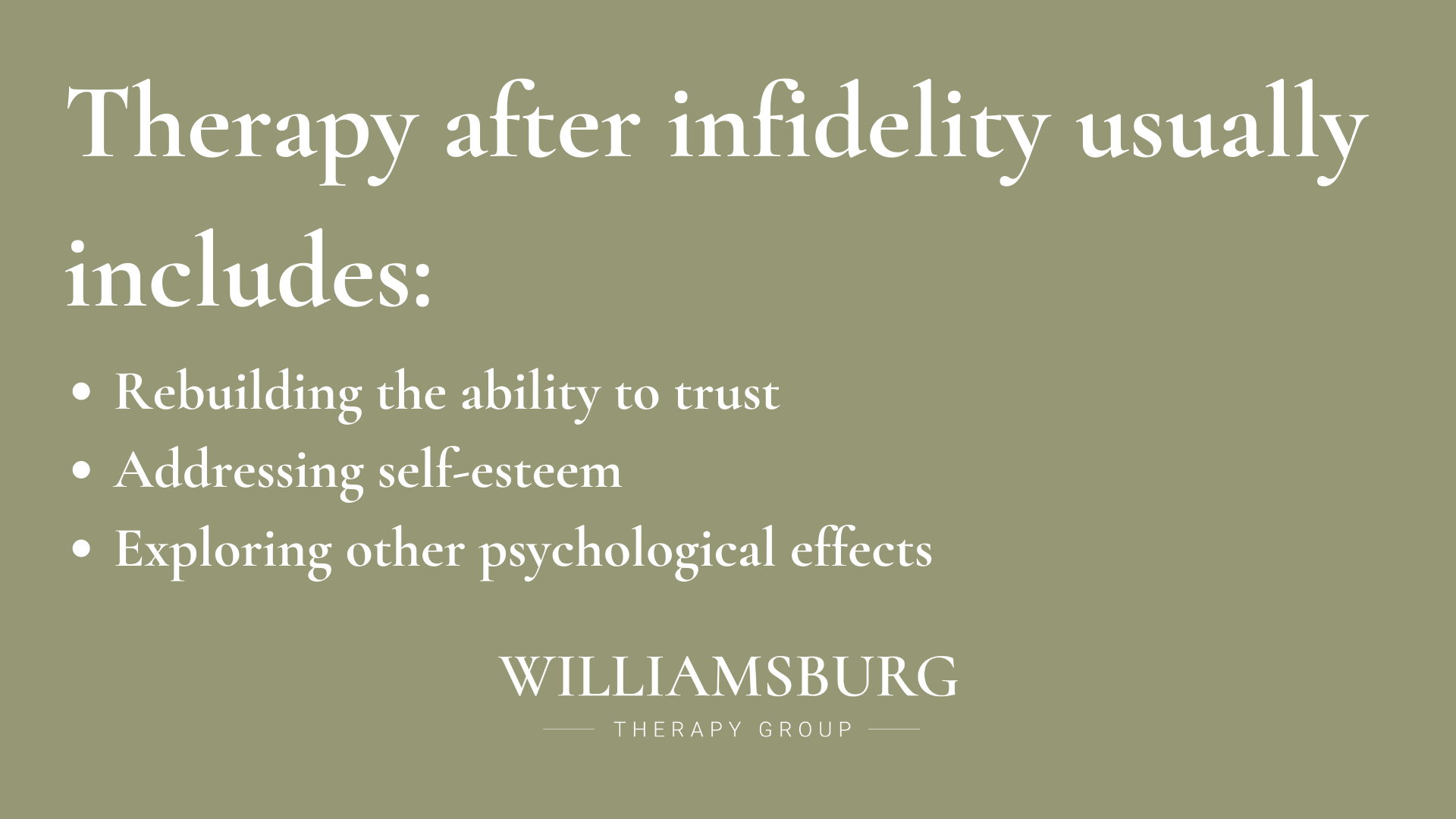How to Express Romantic Love: Effective and Heartfelt Gestures
All the world celebrates romantic love, and people from all walks of life look for ordinary moments and extraordinary ones to express love to their...
4 min read
![]() Williamsburg Therapy Group
:
Mar 20, 2023 11:51:20 AM
Williamsburg Therapy Group
:
Mar 20, 2023 11:51:20 AM

Key Takeaways:
Therapy for divorcees is also called divorce recovery therapy.
Typically a brief 12 to 15 session run using cognitive therapies, divorce recovery therapy helps patients rebuild a sense of self and process the split in a healthy way.
Great. But that doesn't really give you a sense of what to expect from a divorce recovery session.
Let's go more in-depth. Let's talk about how sessions and discussions might look for different types of divorces.
Two things to note before we get started:
Feel free to skip to the section that best fits your situation:
Situation #1: Therapy for a Divorce Due To Cheating
Situation #2: Emotional Incompatibility
Situation #3: Divorce Due to Abuse
Not that any divorce is necessarily easy, but divorce due to cheating or infidelity can be uniquely brutal.
Technically, there are two variants to this situation: being cheated on, and being the cheater. Let's start with the former.
The most acute mental health concern that has likely presented itself if you've just been cheated on is a severe debilitation in your self-esteem levels and your overall ability to trust.
This not only causes you great pain, but it can affect your relationships with friends and family, as well as any future romantic relationships. Getting it addressed is very important.
For many relationships, sex is an intimate, often sacred act that communicates a love between the partners.
Sex between married partners communicates things we can't always put into words:
When we get cheated on, we imagine that our partner has communicated that to someone else. In a monogamous marriage, that can feel equivalent to being thrown in the trash.
That's why our self-esteem can be utterly destroyed after being cheated on: after feeling like we were "chosen", often for years, we suddenly feel as though we weren't. This has an immediate, severe, and chronic effect on our self-esteem.
Self-esteem is your own scorecard on yourself. It factors in your perceived sexual attractiveness, intelligence, and morality, and impacts your performance at work, the way you think about yourself and others, and your mental health in its entirety.
If you've gotten divorced because of cheating, expect to have discussions about your self-esteem and how it has been impacted.
Cheating also destroys trust because, in monogamous marriage, partners swear - certainly to each other and often to their god of choice - to be faithful to each other.
The reality is that married people often put so much trust in each other that their entire sense of trust becomes predicated on one person's monogamous faithfulness. When that faithfulness is destroyed, so is their sense of trust.
Expect to talk about your ability to trust and how changes in it can affect your daily life.

There are thousands of reasons people cheat. Some of the most common factors behind infidelity are:
Part of going to therapy after cheating on someone will involve unpacking your reasons for doing it. Often, they are linked to trauma, so be ready to discuss any underlying trauma that may be affecting your attitude toward marriage and relationships.
Expect to talk about how you think about marriage, as well as accountability and, eventually, self-forgiveness.
About 50% of marriages end in divorce. A large portion of that is people who either were not emotionally compatible to begin with, or who grew apart over time.
In either case, therapy will often revolve around exploring the "self."
When you are married, much of the way you think about yourself is defined by your relationship. When a relationship ends because of emotional differences, it can be extremely disorienting to find yourself again.
A therapist can help you navigate the parts of yourself that have atrophied in the relationship. You might just find that you like those parts.
If there are parts of your character that you aren't proud of, a therapist can work with you to change them in a healthy way.
This is, for many people, the "best" type of divorce - although the situation overall is certainly not good. Many consider it to be only a divorce in so far as the paperwork is concerned: the actual separation is simply an escape from a dangerous situation.
That's true, but that does not mean it's painless.
Once you are safely separated from your abuser, therapy is imperative. Abuse can have extremely debilitating effects on your psychology.
Expect to talk about your trauma (when you're ready). Your therapist will help you navigate the damage it has caused and guide you to the path of healing.
Obviously, those three situations are not the only causes of divorce.
Regardless of the reason, however, talking to a professional may be able to help. Your mental health after a divorce is so important to address, so it's recommended that you get in touch with a relationship therapist as soon as possible.
At Williamsburg Therapy Group, all of our therapists are doctoral-level psychologists, so you know you're getting the best mental healthcare possible.
Schedule an appointment today or give us a call to be matched with the right therapist for you.

All the world celebrates romantic love, and people from all walks of life look for ordinary moments and extraordinary ones to express love to their...

What is relationship burnout or relationship fatigue? Many of us have heard of burnout, but we often connect it to professional life and the problems...

In today's digital age, so many of us are locked into our mobile devices each and every day, which can have a negative impact on our mental...